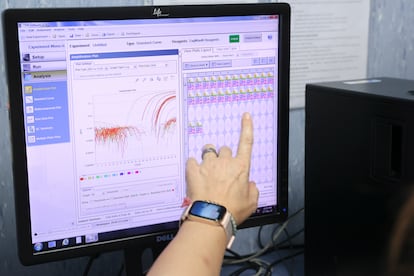Monkeypox: What will happen next?
Experts consider the likely path of the virus, as outbreaks begin to occur around the world.

As cases of monkeypox continue to trickle into various countries around the world, scientists are considering the most likely scenarios. While fears of another pandemic are legitimate, experts consulted by EL PAÍS see it as “very unlikely”; in any case, they say, it would have very different characteristics to Covid-19.
Here are the four scenarios projected by our experts, ordered from most to least likely to occur:
Outbreak contained in a few weeks
Óscar Zurriaga, from the Spanish Society of Epidemiology, and Raúl Rivas González, professor of the Microbiology and Genetics area at the University of Salamanca, believe that the containment measures that are being put in place – detection and isolation of cases – should be enough to stop the virus.
From what is known so far, the pathogen is transmitted by fluids. Therefore, infection can only occur through close contact with another infected person (or animal).
Although at the moment cases continue to increase where there is an outbreak, Rivas González says it is likely that it will end between six and eight weeks after its onset.
There are still several unknowns that keep this scenario hypothetical only. Airborne transmission of the virus has not been entirely ruled out, as cases can be difficult to track and appear in people who do not seem to have been in close contact with other infected people.
Containment using ring vaccination
“I think ring vaccination should start now,” says immunologist and researcher Matilde Cañelles, referring to the practice of immunizing people who have been in contact with infected people, along with their close contacts. France and the United States have already started ring vaccination with the drug used for smallpox, the only human disease that has been eradicated. The smallpox vaccine is believed to provide protection greater than 70% against monkeypox, and includes people of older generations who had the smallpox vaccine as children.
Rivas González also suggests vaccinating health professionals, who may come in contact with the virus in their work. Meanwhile, Zurriaga does not rule out mass vaccination being required at some point: ”I don’t think it’s the right thing to do, but if some country does it, I wouldn’t be surprised if others got behind it for more political reasons than scientific ones.”
Those consulted agree that vaccinations should be enough to make the virus disappear. But it’s not guaranteed either.
The virus becomes endemic
One of the main fears of health authorities is that the virus will become endemic in Europe, as it already is in some African countries. This would mean that there would be outbreaks with relative frequency, either because the contagion in humans is not stopped, or because it reaches animals, from whom the virus repeatedly jumps to people. “That is why isolation of those infected is very important, and also their pets,” says Rivas González.
“And if the virus comes into contact with other animals, it will be much more difficult to control.” That is also why it is so important to discover the origin of this outbreak,” adds the scientist.
An “almost impossible” pandemic
“A pandemic is very unlikely, I would say almost impossible,” says Rivas González, while Zurriaga says it is “very unlikely,”
Cañelles does not see it as a likely scenario either, but she is cautious: “We cannot completely rule out transmission by aerosols, as happened with Covid.” If it was confirmed that monkeypox is transmitted through the air, a pandemic would be more likely.
José Jiménez, an emerging virus researcher at the Department of Infectious Diseases at King’s College London says “there are still too many things we don’t know about the current outbreak.”
“If there’s one thing we should have learned by now, it’s that viruses can always surprise us,” he adds.
Comparisons with Covid are inevitable, but even if monkeypox did become a pandemic, Jiménez points out that there are many differences between the two viruses, noting that SARS-CoV-2 was completely unknown and there were no vaccines or drugs against it - while there are no specific ones for monkeypox, the vaccines used for smallpox seem to be quite effective. It is also a virus that has been known for half a century, has caused frequent outbreaks in Africa and has a much more stable structure than that of the pathogen that has caused Covid.
As Cañelles puts it, “We have the tools to stop it.”
Tu suscripción se está usando en otro dispositivo
¿Quieres añadir otro usuario a tu suscripción?
Si continúas leyendo en este dispositivo, no se podrá leer en el otro.
FlechaTu suscripción se está usando en otro dispositivo y solo puedes acceder a EL PAÍS desde un dispositivo a la vez.
Si quieres compartir tu cuenta, cambia tu suscripción a la modalidad Premium, así podrás añadir otro usuario. Cada uno accederá con su propia cuenta de email, lo que os permitirá personalizar vuestra experiencia en EL PAÍS.
¿Tienes una suscripción de empresa? Accede aquí para contratar más cuentas.
En el caso de no saber quién está usando tu cuenta, te recomendamos cambiar tu contraseña aquí.
Si decides continuar compartiendo tu cuenta, este mensaje se mostrará en tu dispositivo y en el de la otra persona que está usando tu cuenta de forma indefinida, afectando a tu experiencia de lectura. Puedes consultar aquí los términos y condiciones de la suscripción digital.









































